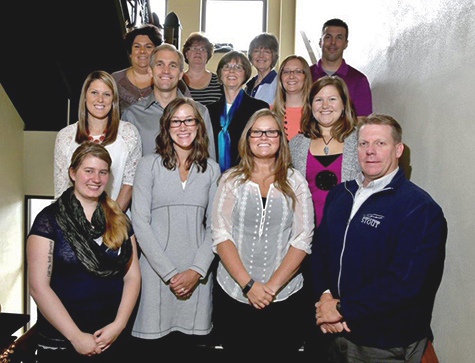By James Marien —
Uncertainty and anxiety are two of the most familiar feelings for students. The number of mental health issues on campuses across the country continues to rise, and counselors, therapists and students continue to battle against them. While University of Wisconsin–Stout’s counseling center is helping out an astounding number of students who seek help for such anxieties, the counselors, directors and staff believe there’s still a lot more that can be done.
Eighty percent of the 1,021 students that visited the counseling center in 2014/2015 gained a greater understanding of their identity through counseling, leaving 20 percent of students left unsure of themselves. Fifty-six percent of students were able to focus better on academics, leaving 44 percent of students left unable to focus. This goes to show that, despite their best efforts, the counseling center could do better with student assistance.
At one of the latest Stout Student Association meetings, Interim Director Jeanne Rothaupt, Interim Associate Dean of Students John Achter and Interim Dean of Students and Director of University Housing Sandi Scott-Duex spoke with the SSA about increasing segregated fees to help better serve the amount of students needing the center.
The increase would go towards properly funding the Counseling Center. Stout students pay segregated fees for student activities, university recreation, health services and the university ID system. On average, $1,038.30 of individual tuition is a result of these segregated fees. Less than 3 percent off those segregated fees, a mere $30.60, goes to funding counseling on campus.
The lack of staffing directly affects students seeking help at the center. As the university continues to grow, the number of students seeking help also increases. The 2014-2015 school year saw 216 more students need help than the previous year; an increase of more than 25 percent.
However, despite the increase in demand, there are only seven staff members in the counseling center, which, according to John Achter, equates to five and a half full-time equivalent (FTE) professional counselors.
“Two of which,” Achter said, “are currently funded by student segregated fees. What is being requested is that two more existing FTE be funded by these fees in order to maintain current staffing levels in light of university budget cuts.”
SSA seemed to understand the request and reacted positively.
“Our perception is that the SSA was supportive, and always has been supportive,” Achter said. And why wouldn’t they be? With over 1,000 students seeking help last year, now is not the time to be making cuts on such a vital part of the university. According to Achter, “There are already waits at the busiest times of the semester, including right now, and if cuts had to be made the waits could be longer, the number of appointments available to students could be limited and some students might not get the service they require.”
Unfortunately, the waiting is unlikely to stop soon. “The actual process for segregated fee approvals occurs in January and February,” Achter said.
In the meantime, however, the Counseling Center does not want the waiting times or budget cuts to deter those who need help and guidance. The center is there for a reason, and should be visited if help is needed.
“In a perfect world, we would be trying to find funding for an increase in staffing, not simply maintaining current levels,” said Achter.
The Counseling Center, fighting to stay staffed, accessible and beneficial, does what it can to maintain mental health on campus.

